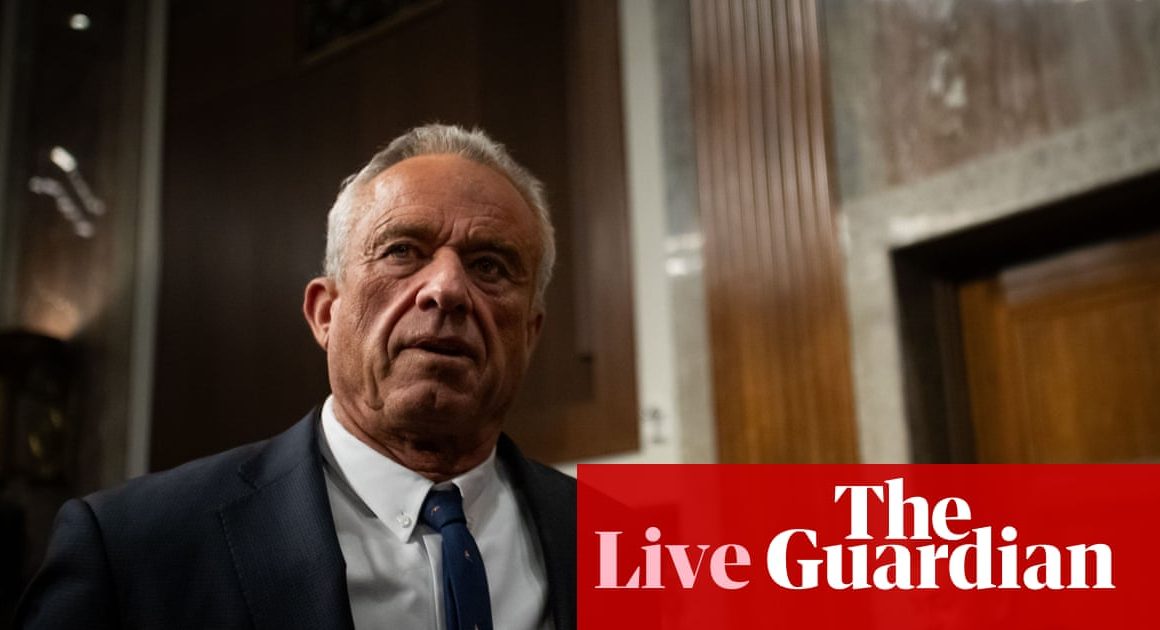Full story: UK economy grows by 0.1% in unexpected boost for Rachel Reeves

Richard Partington
Britain’s economy unexpectedly picked up in the final three months of 2024, official figures have shown, easing pressure on the chancellor, Rachel Reeves, after flatlining during the summer.
Figures from the Office for National Statistics show gross domestic product rose by 0.1% in the fourth quarter of 2024 – after zero growth in the previous three months – to beat the forecasts of City economists and the Bank of England for a decline of 0.1%.
The latest snapshot will provide a shot in the arm for Labour after Reeves faced intense criticism for denting business and consumer confidence with her £40bn tax-raising October budget.
Monthly figures show the economy grew by a better-than-expected 0.4% in December, fuelled by growth in the UK’s dominant services sector after a strong month for business-facing services. Economists had expected growth of 0.1% in December.
Liz McKeown, the ONS director of economic statistics, said:
“The economy picked up in December after several weak months, meaning, overall, the economy grew a little in the fourth quarter of last year.
“Across the quarter, growth in services and construction were partially offset by a fall in production. GDP per head, in contrast, fell back slightly in the quarter.
More here:
Key events
Reeves: Not satisfied with level of growth
Rachel Reeves is insisting that more needs to be done to fix the UK economy, following this morning’s better-than-expected growth figures.
Speaking to broadcasters this morning, after learning that GDP rose by 0.1% in the last quarter of 2024, the Chancellor said:
“The growth numbers have come in higher than many expected, but I’m still not satisfied with the level of growth that our economy is achieving.
“And that’s why I am determined to go further and faster in delivering the economic growth and the improvements in living standards that our country deserves.”
Reeves went on to argue that it isn’t possible to turn around “more than a decade of poor economic performance in just a few months”, saying:
“We are doing what is necessary to bring stability back to the economy, reforming the economy, the planning system, regulation and pensions to encourage investment in our economy, which is the lifeblood of a successful economy
“We need to go further and faster in doing that, to turn around our poor growth performance and to make working people better off.
And she insisted that her fiscal rules are “non-negotiable”, saying her pledge to stick to responsible borrowing levels created stability, allowing three interest rate cuts since last summer’s election.
UK GDP: What the economists say
Rection to this morning’s better-than-expected UK growth figures is pouring in.
Paul Dales, chief UK economist at Capital Economics, predicts that the UK economy will only “move sideways” over the next six months, telling clients:
After stagnating in Q3, the economy was saved from the same fate in Q4 (or worse) by a 0.4% m/m rise in GDP in December (consensus +0.1%, CE -0.1%). That’s pretty much the only growth there’s been for a while as it explains all of the 0.4% rise in GDP since Labour came to power in July and the 0.3% gain since last April.
It’s clear that a lot of the weakness is due to the rise in business taxes announced in October’s Budget as well as soft demand overseas
Anna Leach, chief economist at the Institute of Directors, says the UK ended 2024 with “a welcome growth surprise”, adding:
Professional, scientific and technical activities drove growth in December, and indeed was the strongest growth sector over 2024. Growth this year should be supported by further falls in interest rates. But headwinds to growth are building, from both the international environment and a rapidly softening labour market.
“It is welcome to see signs of life in the economy at the end of 2024. 2025 has already seen a welcome change in tone from the government, with the Chancellor firmly expressing the growth priority. The government has a strong policy pipeline to help improve the environment for investment in the UK, which is key to driving up productivity and growth. Action on industrial strategy, planning reform and infrastructure planning will be instrumental in supporting private sector confidence and investment further out.
Rob Morgan, chief investment analyst at Charles Stanley, says the growth in Q4 will provide “some rare relief for Chancellor Rachel Reeves”, but cautions:
It is not a time for victory laps certainly, and the danger of recession hasn’t gone away, but relative to expectations this is a win for the Chancellor. Concerns of a weak festive period did not transpire, and it offers something to build on this year.
Overall, it appears likely there will be a continued small improvement, at least in the short term. Consumers and businesses will continue to benefit from falling interest rates with three cuts made in the past six months or so. The boost to government spending should also provide a temporary uplift.
Debapratim De, director of economic research at Deloitte, sees “sluggish growth” in the short term:
“GDP growth has come in above expectations in the fourth quarter but by a small margin. Underlying momentum remains weak.
“Today’s data does not change our outlook for 2025. We continue to expect sluggish growth through spring, with the fiscal easing from last year’s Autumn Budget driving a pickup in activity over summer.”
Full story: UK economy grows by 0.1% in unexpected boost for Rachel Reeves

Richard Partington
Britain’s economy unexpectedly picked up in the final three months of 2024, official figures have shown, easing pressure on the chancellor, Rachel Reeves, after flatlining during the summer.
Figures from the Office for National Statistics show gross domestic product rose by 0.1% in the fourth quarter of 2024 – after zero growth in the previous three months – to beat the forecasts of City economists and the Bank of England for a decline of 0.1%.
The latest snapshot will provide a shot in the arm for Labour after Reeves faced intense criticism for denting business and consumer confidence with her £40bn tax-raising October budget.
Monthly figures show the economy grew by a better-than-expected 0.4% in December, fuelled by growth in the UK’s dominant services sector after a strong month for business-facing services. Economists had expected growth of 0.1% in December.
Liz McKeown, the ONS director of economic statistics, said:
“The economy picked up in December after several weak months, meaning, overall, the economy grew a little in the fourth quarter of last year.
“Across the quarter, growth in services and construction were partially offset by a fall in production. GDP per head, in contrast, fell back slightly in the quarter.
More here:
UK’s manufacturing recession continues as carmaking declines
Today’s GDP report shows that Britain’s production sector has shrunk for the last five quarters in a row, with activity declining by 0.8% in the fourth quarter of last year.
The fall in production was largely driven by a 0.7% decline in manufacturing and a 2.5% decline in mining and quarrying, the Office for National Statistics report.
The largest negative contributions came from the manufacture of transport equipment, which fell by 2.3%, and the manufacture of pharmaceuticals, which fell by 4.0%.
The ONS says:
The manufacture of transport has fallen for three consecutive quarters, mainly because of a decline in the manufacture of motor vehicles and motorcycles.
Data earlier this year showed that British car production fell in 2024 to its lowest level in seven decades – barring the coronavirus pandemic – as the industry struggles with weak demand and prepares to shift away from fossil fuels to electric vehicles.
Shadow chancellor Mel Stride has accused chancellor Rachel Reeves of “killing growth” with her budget, delivered at the end of October – despite the economy growing by a decent 0.4% in December.
Stride claims working people and businesses are “already paying for her choices.”
“The Chancellor promised the fastest growing economy in the G7, but her budget is killing growth.
“Working people and businesses are already paying for her choices with ever rocketing taxes, hundreds of thousands of job cuts and business confidence plummeting.
“It does not need to be this way.
“Under new leadership, the Conservative Party will continue to oppose Labour’s disastrous decisions and stand up for businesses and working people up and down our country.”
UK mid-table for G7 growth
The UK appears to be mid-table for growth among G7 nations at the end of last year.
Britain’s growth of 0.1% in October-December puts it behind the US, which expanded by almost 0.6% in the quarter, and Canada where GDP is estimated to have expanded by 0.4%.
Japan’s GDP data, due on Sunday night, is expected to show growth of 0.3%.
The UK has outpaced the eurozone, which stagnated in Q4 2024, as did Italy. France shrank by 0.1% in the quarter, while the troubled German economy contracted by 0.2%.
Despite beating European rivals, the government clearly has work to do to hit its mission of making Britain the fastest-growing economy in the G7.
Pound rises over $1.25
The pound has hit a one-week high, after this morning’s GDP data beat expectations.
Sterling is up over half a cent at just over $1.25.
It has already been strengthening, as the markets welcomed the prospect of a peace deal between Ukraine and Russia.
Reeves: I won’t accept failing economy
Chancellor of the Exchequer Rachel Reeves has responded to this morning’s GDP report, saying:
“For too long, politicians have accepted an economy that has failed working people. I won’t.
“After 14 years of flatlining living standards, we are going further and faster through our Plan for Change to put more money in people’s pockets.
“That is why we are taking on the blockers to get Britain building again, investing in our roads, rail and energy infrastructure, and removing the barriers that get in the way of businesses who want to expand.”
Real GDP per head falls for second quarter running
Worryingly, though, once you adjust for population changes you see that UK economic activity per person actually fell over the last two quarter.
Real GDP per head is estimated to have fallen by 0.1% in Quarter 4 2024, the ONS says.
Its first estimate shows that there was a slight fall in GDP per head of 0.1% in 2024.
Economy picked up in December
In December alone, UK GDP expanded by a faster-than-expected 0.4% – helping the economy to grow in the final quarter of 2024.
ONS director of economic statistics Liz McKeown says:
“The economy picked up in December after several weak months, meaning, overall, the economy grew a little in the fourth quarter of last year. Across the quarter, growth in services and construction were partially offset by a fall in production. GDP per head, in contrast, fell back slightly in the quarter.
“In December wholesale, film distribution and pubs and bars all had a strong month, as did manufacturing of machinery and the often-erratic pharmaceutical industry. However, these were partially offset by weak months for computer programming, publishing and car sales.”
The UK economy was supported by growth in the services sector, and in construction, in the final quarter of last year.
Britain’s services sector grew by 0.2%, while construction expanded by 0.5%.
The manufacturing sector contracted, though, with production output down by 0.8%.
UK beats forecasts as GDP rises 0.1% in October-December
Newsflash: Britain’s economy has avoided dropping into recession, after posting modest growth at the end of last year.
UK GDP rose by 0.1% in October-December, better than City economists had expected – they’d pencilled in a 0.1% fall in activity, which would have put the economy on the brink of a technical recession.
This will be a relief for chancellor Rachel Reeves.
That follows no growth in July-September, as previously reported.
The Office for National Statistics reports that the services and construction sectors grew, while production output fell.
However, the economy did shrink in Q4 on a per capita basis (GDP per head of population) – see here.
The UK government is hoping to spur growth by starting construction up to 12 new towns by the next election.
Each new town will have the potential for at least 10,000 homes with accompanying infrastructure, as the government promised to sweep away red tape and overcome environmental objections to get them built.
More here:
Introduction: UK GDP report in focus
Good morning, and welcome to our rolling coverage of business, the financial markets and the world economy.
We’re about to learn how the UK economy fared in the final three months of 2024.
The first estimate of UK GDP for the October-December quarter is due to be released at 7am, but it may not make cheerful reading for the government.
City economists are expecting to learn that the economy shrank by 0.1% in Q4 2024, which would Britain on the brink of a technical recession – defined as two quarterly contractions in a row.
The economy stagnated in July-September, so expectations are that the economy hasn’t grown in the two quarters since Labour won the general election in July.
Today’s data will also show how the economy performed in December. Earlier data has shown that GDP fell by 0.1% in October, followed by a 0.1% rise in November (these figures could be revised, though.)
And there are tougher times ahead, as Donald Trump threatens to ignite a trade war.
Michael Field, chief equity strategist at Morningstar, says:
Some sectors of the UK economy are clearly struggling, such as manufacturing and particularly areas like chemicals, as they are grappling with high energy prices relative to the US, making them less competitive. The danger is that US tariffs could also worsen the situation for exporters.
Interest rates have fallen by 75 basis points from the peak, with the market expecting another 65 basis points of cuts this year. The cuts may be coming at a slower pace than markets would like, but over time these cumulative cuts should help create a more supportive economic environment for businesses.”
The agenda
-
7am GMT: UK GDP report for October-December 2024
-
7am GMT: UK trade report for October-December 2024
-
9am GMT: IEA oil market report
-
9.30am GMT: Business investment in the UK: October to December 2024, provisional results
-
1.30pm GMT: US weekly jobless claims










